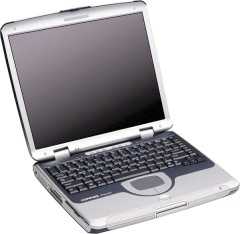Our Early History Together
The internet has been around, long before I came into being on this planet. From the early days of the ARPANET in the 1960s to the creation of the WorldWideWeb, the internet was still nothing but a shadow of what it has become today when I was born in August 1986. Being a child of the late 80s, growing up in the 90s, I grew up with the internet explosion that would occur and continues to impact my life in various ways.My introduction to the internet was in 1996 at the age of 10, on a, then brand new, Packard Bell PC with a 133MHz processor, 16MB of RAM, a 1GB hard drive, and a 28.8K modem. My parents bought the computer with the intent of helping my education. I was instantly hooked, for one hour at a time, as our internet was paid for by the hour. With my Windows 95 machine, I quickly learned to ditch the virtually useless Internet Explorer for a more user friendly Netscape Navigator.
 |
| Picture 1. Netscape Navigator, early version. |
I spent hours in online chat rooms, playing Shockwave and Flash games, but also began to see the internet impact my education. Before the internet, whenever I was assigned a research paper, I would have to spend hours at the school or local public library to research books and encyclopedias as my family did not have those resources at home. Now with my online connection, I could easily access Microsoft Encarta online, or World Book Online to assist with my research. Our librarian showed me how to access online databases and journals as well.
By 8th grade, I had already started playing around with developing websites. In a time before Myspace and Facebook, there was Yahoo Geocities. Eager to learn more, I was one of the first to sign up for a new class that taught 8th graders web site design. My project was a fan site for Star Trek, for which I received an A.
Upon reaching high school, our internet and PC got an upgrade. I was now accessing the internet from a Gateway 2000, Windows 98 PC with a blazing fast 56K modem. By now I was adding streaming videos to my PowerPoint projects, and e-mailing my projects to my teachers as they would not fit on a 3.5" Floppy Disk, that topped out at 1.44MB. I even used the internet as a major plot point in my video project about transcendentalists for my American Literature class. In the pictures below, my character is arrested for "illegally downloading" Walt Whitman stories.
Picture 2. My character accessing Walt Whitman poems online. (2002)
Picture 3. My character being arrested by the FCC. (2002)
During my time in high school, I was starting to use search engines for assignments, posting work online to websites, and contacting teachers for help with assignments.
By the end of my high school experience, I was frequently complimented by my teachers on my technological prowess. By the time I went to college, I had to choose between a career in technology or a career in my childhood dream of teaching.
The College Years with Internet
 |
| Picture 4. Compaq Presario, 2004 Model |
When entering college, I found all of my course descriptions and college schedules online. I took my first online course through BlackBoard. I remember the painstaking hours I spent refreshing my browser, waiting on instructors to post my test grades and even more time waiting for my final grades. I never received a paper report card again, I just looked on the internet.
For the first time, I received a school e-mail account that I was expected to check daily. I would have to look in my e-mail for instructors' assignments, campus events, and course registration deadlines, even scholarship and financial aid opportunities.
As I transferred between colleges, my tuition went up and I needed assistance. I complete the entire student loan process online through Sallie Mae's website. I applied for Fafsa online as well.
I took my first education course and from that moment on, I knew that my passion was teaching. However, having a strong interest in technology gave me a unique skill set, a technology savvy teacher. I was required to take an education technology course in college as part of the teacher education program. In this class I was introduced to some of the various ways teachers could use the internet for education. There were not nearly as many tools out there for teachers, other than creating teacher websites. Many of the tools needed to be created by the teachers themselves.
 |
| Picture 5. Dell Inspiron 1720, 2008 |
content was putting a drag on my aging laptop, so before my student teaching I upgraded to a
During my student teaching, I collaborated with my supervising instructor and 15 other student teachers using a website called NiceNet. When preparing lesson plans, I looked at textbook websites for additional online activities and supplemental worksheets and materials. I created a website where I could post assignments, due dates, extra resources, and communicate with students and parents. With the demise of Geocities, I was switching over my attention to Google's services. My website is still online through Google Sites.
Picture 6. My original class website I used for my student teaching - 2009
As college drew to a close, I used only one method to scout for potential jobs, online postings.
The Internet & My Teaching Career
In the middle of my college education, two things happened that makes the story a little tragic. A huge financial crisis hit in which banks were failing and the automotive industry in the US tanked. Illinois was not immune to this. Many of my classmates suddenly found it hard to get student loans, myself included. Huge budget cuts led to a strong decrease in the demand for teachers in Illinois. By the time I graduated college, many schools were laying off teachers and reducing their staff at a time when a record number of education majors were graduating college.
For over a year I applied at various schools without a single interview as I was now competing against recently unemployed teachers with experience. K-12 Jobspot, Illinois Education Job Bank, and school district websites were all added to my bookmarks. I completed numerous applications online via Applitrack. I even completed some of my interviews, when I did get interviews, via Skype video chat.
When I finally got hired into a school district, things began to turn around for me. First and foremost, I landed the dream job I always wanted. I was teaching Social Studies at my alma matter, Eureka High School. I was instantly recognized for having a strong skill set with integrating technology into the classroom. I was one of the first to bring an iPad into the school and later test piloted a classroom set of iPads.
I began using tools in my classroom such as Edmodo, for tests, quizzes, and projects. I used online assessment tools such as Socrative for forming my instruction and assessing student knowledge. I used NearPod to allow students to interact with presentations and participate in lessons. I took it upon myself to learn more about the educational potential of the internet in education and enrolled in a Master's Degree program specializing in Education Technology. Through this program I have implemented Blogs, Video and Audio Podcasts, and various other web tools to enhance my instruction.
Education Technology Masters Work Samples
Before I knew it, many teachers were asking me for help with using online Web 2.0 tools like the ones I mentioned. Over the next couple of years my role has switched from educator of students about Social Studies, to educator of teachers about using the internet in the classroom. Using Facebook and Twitter, I kept in contact with teachers and instructors as well as parents and past students.
Then there was the contest. Polleverywhere.com, an internet site I had used in the past to instantly survey students, put out a contest to see who can come up with the most creative polls. The top 3 would compete to see who could get the most responses. With the help of my students, we won!
 |
| Picture 7. Me holding the grand prize from Poll Everywhere's contest, 2013 |
The Internet is My Education Career
However, due to budget cuts and decreasing enrollment, I was losing my teaching job. After each school year my class load was being reduced until this spring (2014). I was told that there would be no teaching position available for me. It was a real low point in my life personally, I must admit. I knew the odds of finding another teaching job were slim and there is little else one can do with a Bachelors Degree in History and Education. However, there is a silver lining to my story.Because of my experience, growing up with the internet, my fascination with combining education with technology, and the timing of everything that has led me to this point, I was chosen to fill a new position at my school. It was just created this summer and it is an opportunity that, had I had a teaching position, I might not have considered. This position would focus on teaching teachers about integrating Web 2.0 and near future Web 3.0 tools into the classroom. I proudly look forward to continuing my career as a educator of technology, combining my two passions.
So when I am asked, what impact has the internet had on my life? It is hard not laugh. The internet has had an overwhelming impact on my education, as a student and an educator. Now it is directly tied to my career. Without the opportunities presented to me by the internet, I would be nowhere near where I am today without it.
(See video below for full dramatic effect :) )
The internet may have its drawbacks. There have been research that shows the dangers of internet addiction, online theft of privacy, and so on. One drawback that I can say the internet has had on my education is the overwhelming amount of material out there. It is tough to say I am finished with a lesson plan or an assignment, when I constantly am exposed to newer and better things. However, the benefits that it has bestowed on my life well outweighs the drawbacks.
This is my story with the internet thus far...




excellent course and i gained a lots of knownledge
ReplyDeleteair hostess training in Chennai
The information you've provided here is fantastic because it provides a wealth of information that is really useful to me. Thank you for sharing that. home tuition
ReplyDeleteInternet services typically provided by ISPs can include Internet access, Internet transit, domain name registration, web hosting, Usenet service, and colocation. An ISP typically serves as the access point or the gateway that provides a user access to everything available on the Internet. I know everyone looks for secure internet services with best security. I recommend Elevate Technology company, which provides the best IT Support Services in Brisbane at affordable rates. They can help you to choose the right internet services.
ReplyDelete